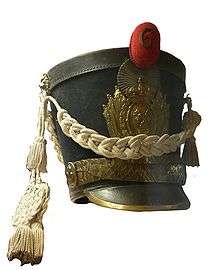shako
English
WOTD – 15 December 2006

Shako
Etymology
Borrowed from French shako, from Hungarian csákó a cylindrical military dress hat worn by the Hungarian hussars (from the 18th century to World War I).
Pronunciation
Noun
Translations
Ido
Etymology
Borrowed from English chess, French échec, German Schach, Italian scacco, Russian ша́хматы (šáxmaty), Spanish jaque.
Derived terms
Japanese
This article is issued from
Wiktionary.
The text is licensed under Creative
Commons - Attribution - Sharealike.
Additional terms may apply for the media files.